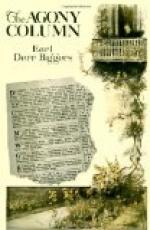“Enwright?” whispered Hughes.
“Not a doubt of it!” said I.
“Good!” he replied with fervor.
And now another man shuffled down the street and stood suddenly straight and waiting before the colonel.
“Stay with him,” said Hughes softly. “Don’t let him get out of your sight.”
“Very good, sir,” said the man; and, saluting, he passed on up the stairs and whistled softly at that black depressing door.
The clock above the Millwall Docks was striking eleven as the colonel and I caught a bus that should carry us back to a brighter, happier London. Hughes spoke but seldom on that ride; and, repeating his advice that I humor Inspector Bray on the morrow, he left me in the Strand.
So, my lady, here I sit in my study, waiting for that most important day that is shortly to dawn. A full evening, you must admit. A woman with the perfume of lilacs about her has threatened that unless I lie I shall encounter consequences most unpleasant. A handsome young lieutenant has begged me to tell that same lie for the honor of his family, and thus condemn him to certain arrest and imprisonment. And I have been down into hell, to-night and seen Archibald Enwright, of Interlaken, conniving with the devil.
I presume I should go to bed; but I know I can not sleep. To-morrow is to be, beyond all question, a red-letter day in the matter of the captain’s murder. And once again, against my will, I am down to play a leading part.
The symphony of this great, gray, sad city is a mere hum in the distance now, for it is nearly midnight. I shall mail this letter to you—post it, I should say, since I am in London—and then I shall wait in my dim rooms for the dawn. And as I wait I shall be thinking not always of the captain, or his brother, or Hughes, or Limehouse and Enwright, but often—oh, very often—of you.
In my last letter I scoffed at the idea of a great war. But when we came back from Limehouse to-night the papers told us that the Kaiser had signed the order to mobilize. Austria in; Serbia in; Germany, Russia and France in. Hughes tells me that England is shortly to follow, and I suppose there is no doubt of it. It is a frightful thing—this future that looms before us; and I pray that for you at least it may hold only happiness.
For, my lady, when I write good night, I speak it aloud as I write; and there is in my voice more than I dare tell you of now.
Theagony column man.
Not unwelcome to the violet eyes of the girl from Texas were the last words of this letter, read in her room that Sunday morning. But the lines predicting England’s early entrance into the war recalled to her mind a most undesirable contingency. On the previous night, when the war extras came out confirming the forecast of his favorite bootblack, her usually calm father had shown signs of panic. He was not a man slow to act. And she knew that, putty though he was in her hands in matters which he did not regard as important, he could also be firm where he thought firmness necessary. America looked even better to him than usual, and he had made up his mind to go there immediately. There was no use in arguing with him.




